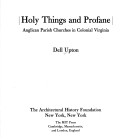Architectural History Foundation Book
1 total work
Winner of the Abbott Lowell Cummings Prize from the Vernacular Architecture Forum, 1987. and Winner, Alice Davis Hitchcock Award, Society of Architectural Historians."Holy Things and Profane" is an innovative study of the relationship between artifacts and society. It examines the symbolism and ideology of the Anglican churches of colonial Virginia, focusing not only on the buildings but on their surviving fittings and furnishings - silver, furniture, books, decorative arts - and on the social and religious rituals that they framed. By setting these in the context of the public and domestic landscapes, Dell Upton creates a comprehensive portrait of colonial Virginia's artifactual world that will serve as a model for future studies of architecture and material culture.Upton points out that in the first part of the eighteenth century the Anglican church in Virginia was dominated by an authoritarian gentry. Using the parish as a revealing microcosm of a particular world, he demonstrates how Virginia's ruling elite used the "holy" church to buttress their own "profane' power. Their methods included the modeling of church decorations and furnishings on the artifacts of the great plantation houses to reinforce the visual imagery of the colony's social hierarchy.Even before the revolution, Upton notes, there was widespread dissatisfaction with the social hierarchy implied by the church, and by the end of the century the gentry either relinguished such claims or witnessed the collapse of their parishes. In this masterful and fully illustrated study, he shows the Virginia parish to have been a central institution of the colony's life, inextricably bound to its social, political, and economic dynamics.Dell Upton is Assistant Professor of Architectural History at the University of California, Berkeley. An Architectural History Foundation Book.
